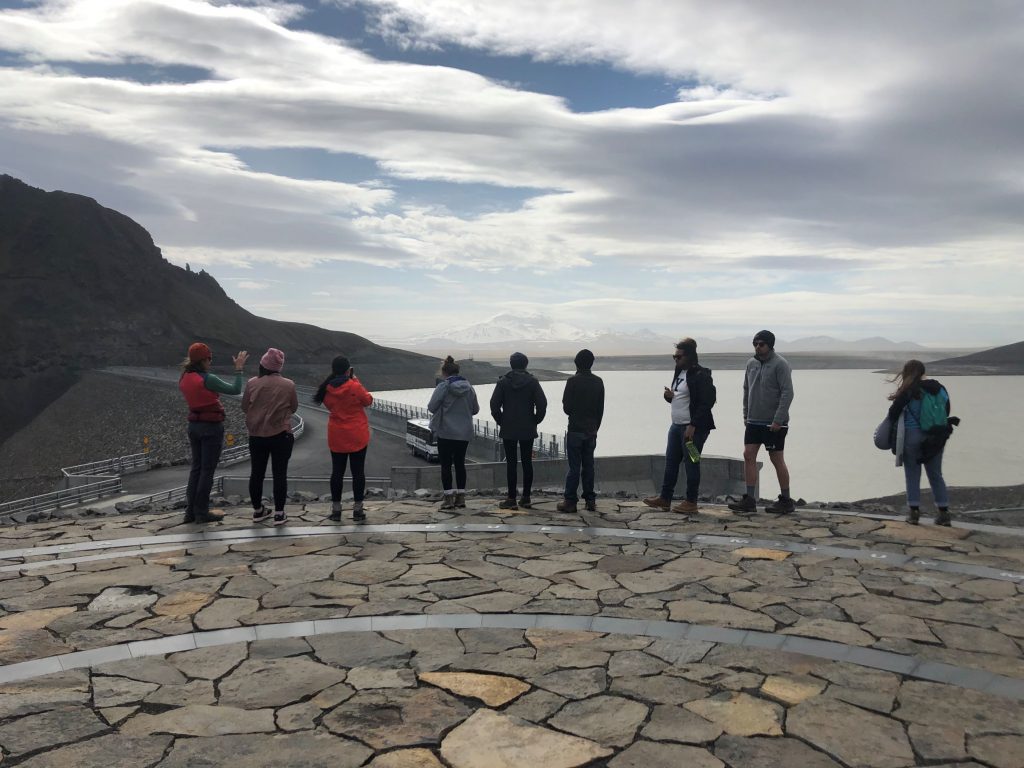SIT Iceland program set to achieve carbon neutrality
Publication Date: September 3, 2019
Publication Location: Brattleboro, Vermont
Contact: Kate Casa | [email protected]

FOR IMMEDIATE RELEASE
BRATTLEBORO, Vermont – An SIT summer program in Iceland is set to become one of the first U.S. study abroad programs to fully offset carbon emissions resulting from air and ground travel that contribute to the climate crisis.
Michelle Stewart, academic director of the first summer track of SIT Iceland: Renewable Energy, Technology, and Resource Economics, and Guðmundur Sigurðarson, a lecturer on the program, worked with local officials to devise a plan to plant about 220 trees in a community forest around the northern Iceland city of Akureyri, where the SIT program is based for part of the summer.
The trees will eventually absorb enough carbon to offset the effects of SIT faculty and staff and 20 U.S. students who traveled to and around Iceland in June and July to examine hydroelectric, geothermal, wind, and solar power.
“Carbon capture is not always thought of as being one of the important parts of the puzzle. But reclamation and reforestation are really important,” said Stewart, who has a PhD in human-environment geography from the University of Colorado-Boulder. “Iceland was once about 25 percent forested and now is only about 2 percent forest cover, so reforestation is seen as a way to reach a carbon neutral future.”
“I feel lucky to have been a part of this program that is so conscious of its own impact, and very excited that trees will be planted in our name through SIT to offset our trip’s carbon footprint,” said Nash Keyes, an applied mathematics major at Yale.
SIT President Dr. Sophia Howlett said climate recovery is a critical global issue at the top of SIT’s academic agenda. “This must be on the minds of all of us who support and promote experiential international education. Achieving carbon neutrality on this program is a powerful first step. Not only are we directly reducing SIT’s carbon footprint, we are helping future leaders develop the scope, knowledge, and wherewithal they will need to surmount this challenge,” said Howlett.
Sigurðarson, who is trained as an engineer, works with an organization that coordinates green energy projects for Akureyri, a city that has been proactive in addressing the climate crisis. Akureyri has hydroelectric power, a composting plant and a system to convert methane to fuel its municipal buses.
Sigurðarson helped arrange meetings with local officials and the forestry bureau to explore how the SIT program could capture the carbon it produced. As a result, SIT will sponsor the planting of 220 trees this month in what local residents call the “Flight Forest” near their city. Although it will take 60 to 70 years for the trees to capture the emissions produced by the program, Stewart and Sigurðarson anticipate the investment will pay immediate dividends in how the students approach climate change from now on.
“When talking to students, they realize that they have this task ahead. They know that they have to get involved somehow and they have to understand it,” Sigurðarson said.
That was the case for Keyes. “My experience in Iceland and our opportunity to mitigate our carbon footprint made me much more educated about and conscious of my energy use, both in Iceland and at home,” they said. “Back in the US now … I am thinking much more carefully about my energy use and where my energy comes from.”
Iceland puts students in an environment where climate change is not debated, Stewart said. There, “it’s a reality, and the question is ‘how are we going to do this?’ It makes them part of the solution,” she noted.
For Keyes, the way SIT approached the carbon offset question was also important. “In too many study abroad and service trips, foreign groups, especially American ones, come into a country or region without a lot of respect for local culture, society, and autonomy, and act as if they know better. This direct local engagement felt very fitting as a way to counteract that trend through contributing to a preexisting, Icelander-led program.”
